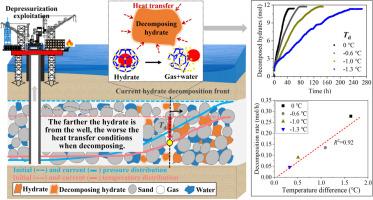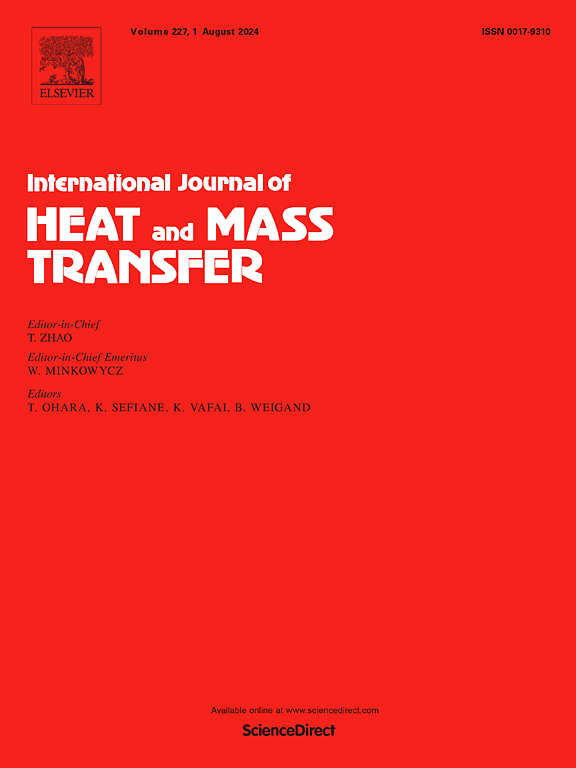不良传热条件下减压甲烷水合物沉积物的分解热动力学和热平衡分析
IF 5.8
2区 工程技术
Q1 ENGINEERING, MECHANICAL
International Journal of Heat and Mass Transfer
Pub Date : 2024-11-25
DOI:10.1016/j.ijheatmasstransfer.2024.126480
引用次数: 0
摘要
甲烷水合物是海底矿床中一种重要的天然气资源形式,其开采效率主要取决于水合物的就地分解。在大规模水合物矿床的减压开采过程中,远井筒矿床的传热状况极有可能比近井筒矿床的传热状况更差;然而,在传热状况不佳的条件下,水合物分解的热力学和动力学特征尚不明确,尤其缺乏热平衡分析理论。本研究在实验中采用了外部温度控制技术,以恶化传热状况,并研究其对减压至 2.9 MPa 的甲烷水合物矿床分解热动力学的影响。结果发现,不同传热情况下甲烷水合物的稳定分解率与温差呈线性关系,随着传热情况的恶化,分解出现停滞。根据这些结果,建立了一种新型的水合物分解减压矿床热平衡模型,该模型可以准确预测水合物分解矿床的动态温度响应,偏差不超过 8.9%。此外,在较差的传热条件下,低水合物分解率引起了压力和温度的协同波动,而这种波动可以通过逐步升温得到改善。该研究首次揭示了在较差传热条件下甲烷水合物分解的热力学和动力学行为,有助于预测远井筒水合物矿床的现场开采特征。本文章由计算机程序翻译,如有差异,请以英文原文为准。

Decomposition thermokinetics and heat balance analysis of depressurized methane hydrate deposits under poor heat transfer conditions
Methane hydrate is an important form of natural gas resource found in submarine deposits, with exploitation efficiency mainly determined by in-situ hydrate decomposition. During the depressurization exploitation process of large-scale hydrate deposits, the heat transfer situation of far-wellbore deposits is highly likely to be worse than that of near-wellbore deposits; However, the thermodynamic and kinetic characteristics of hydrate decomposition under poor heat transfer conditions are still unclear, particularly lacking heat balance analysis theory. This study adopted an external temperature control technique in experiments to worsen the heat transfer situation and investigate its effects on the decomposition thermokinetics of depressurized methane hydrate deposits to 2.9 MPa. The stable decomposition rates of methane hydrates under different heat transfer situations were found to be linear with temperature difference, and decomposition stagnation was observed as heat transfer worsened. Based on these results, a novel heat balance model of depressurized deposits with hydrate decomposition was developed, which can accurately predict the dynamic temperature response of hydrate decomposition deposits with a deviation of no >8.9 %. In addition, the low hydrate decomposition rate under a worse heat transfer condition induced synergistic fluctuations in pressure and temperature, which can be improved with progressive warming. This study reveals the thermodynamic and kinetic behaviors of methane hydrate decomposition under poor heat transfer conditions for the first time and can help predict the spot exploitation characteristics of far-wellbore hydrate deposits.
求助全文
通过发布文献求助,成功后即可免费获取论文全文。
去求助
来源期刊
CiteScore
10.30
自引率
13.50%
发文量
1319
审稿时长
41 days
期刊介绍:
International Journal of Heat and Mass Transfer is the vehicle for the exchange of basic ideas in heat and mass transfer between research workers and engineers throughout the world. It focuses on both analytical and experimental research, with an emphasis on contributions which increase the basic understanding of transfer processes and their application to engineering problems.
Topics include:
-New methods of measuring and/or correlating transport-property data
-Energy engineering
-Environmental applications of heat and/or mass transfer

 求助内容:
求助内容: 应助结果提醒方式:
应助结果提醒方式:


